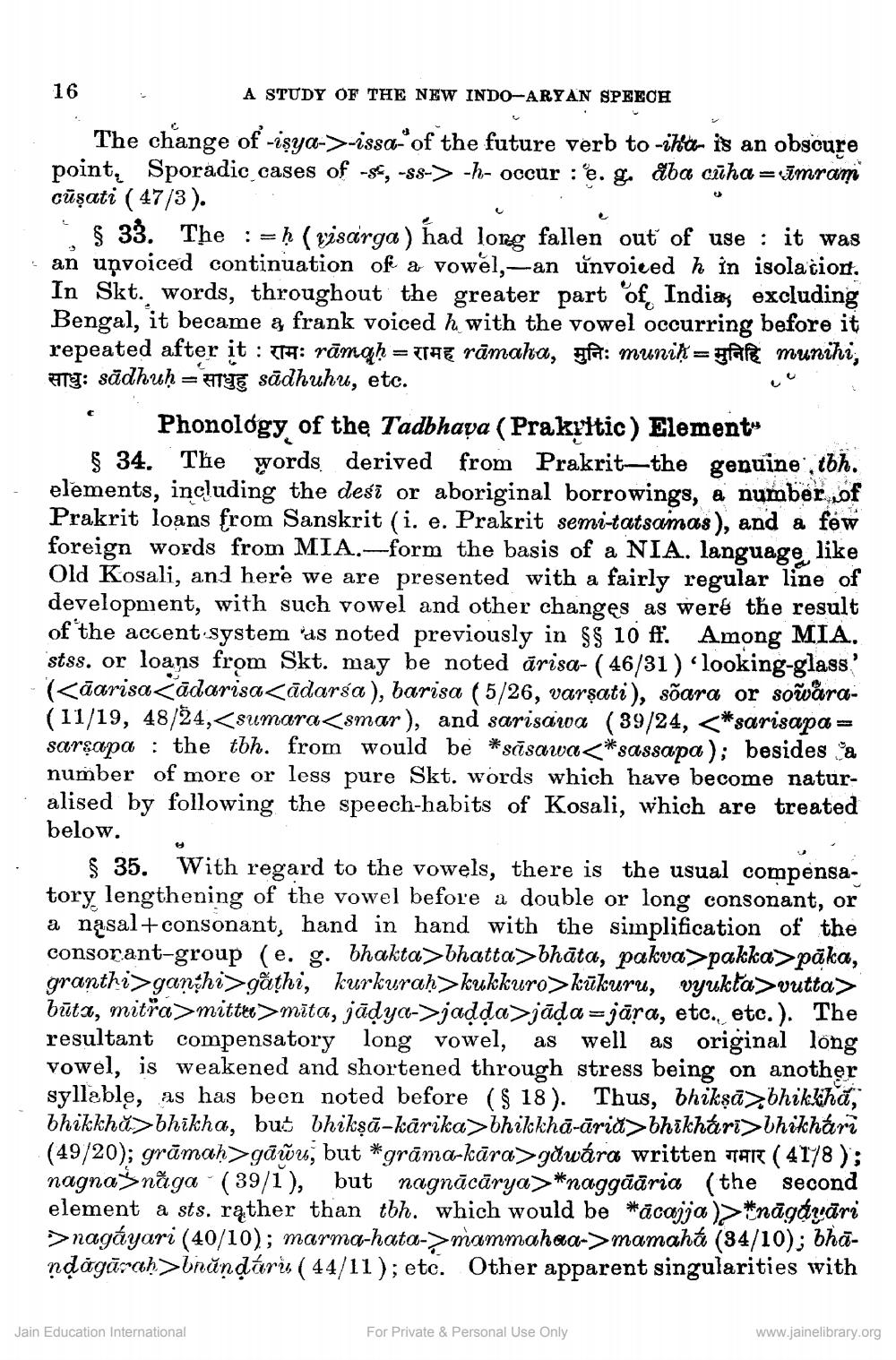________________
16 . A STUDY OF THE NEW INDO-ARYAN SPEECH
The change of -isya->-issa of the future verb to-ibitem is an obscure point, Sporadic cases of -55, -88-> -h- occur : e. g. aba cūha=mram cūșati ( 47/3).
§ 33. The := h (risarga) had long fallen out of use : it was · an unvoiced continuation of a vowel,-an ứnvoiced h in isola ciort.
In Skt. words, throughout the greater part of India's excluding Bengal, it became a frank voiced h with the vowel occurring before it repeated after it : T4: rāmgħ = TTAT rāmaha, gfa: muniķ= grape munihi; Fry: sādhuḥ = "HTUE sādhuhu, etc.
Phonology of the Tadbhava (Prakritic) Elements
34. The words derived from Prakrit—the genuine, tbh. elements, including the desi or aboriginal borrowings, a number of Prakrit loans from Sanskrit (i. e. Prakrit semi-tatsamas), and a few foreign words from MIA.-form the basis of a NIA. language like Old Kosali, and here we are presented with a fairly regular line of development, with such vowel and other changes as were the result of the accent system as noted previously in $s 10 ff. Among MIA.. stss. or loans from Skt. may be noted ārisa- ( 46/31 ) looking-glass' <<āarisa<ādorisa<ādarsa ), barisa (5/26, varşati), sõara or sowara(11/19, 48/24,<sumara<smar), and sarisawa (39/24, <*sarisapa = sargapa : the tbh. from would be *sāsawa<*sassapa); besides a number of more or less pure Skt. words which have become naturalised by following the speech-habits of Kosali, which are treated below.
§ 35. With regard to the vowels, there is the usual compensatory lengthening of the vowel before a double or long consonant, or a nasal+consonant, hand in hand with the simplification of the consorant-group (e. g. bhakta>bhatta>bhāta, pakva>pakka>pāka, granthi>ganthi>găthi, kurkuraḥ>kukkuro>kūkuru, vyukta>vutta> būtä, mitřa>mittee >mīta, jādya->jadda>jāda=jāra, etc., etc.). The resultant compensatory long vowel, as well as original long vowel, is weakened and shortened through stress being on another syllable, as has been noted before ($ 18). Thus, bhikṣā>bhikkha, bhikkhå>bhikha, but bhikṣā-kārika>bhikkha-ārið> bhikhárī>bhikhari (49/20); grāmaḥ>gāữu, but *grāma-kāra>gàwára written TAR ( 41/8); nagna någa (39/1), but nagnācārya> *naggāāria (the second element a sts. rather than tbh. which would be *acajja )>*nāgayāri >nagáyari (40/10); marma-hato-> mammahaa->mamahá (34/10); bhāndägācah>bnăndáriu ( 44/11); etc. Other apparent singularities with
Jain Education International
For Private & Personal Use Only
www.jainelibrary.org




